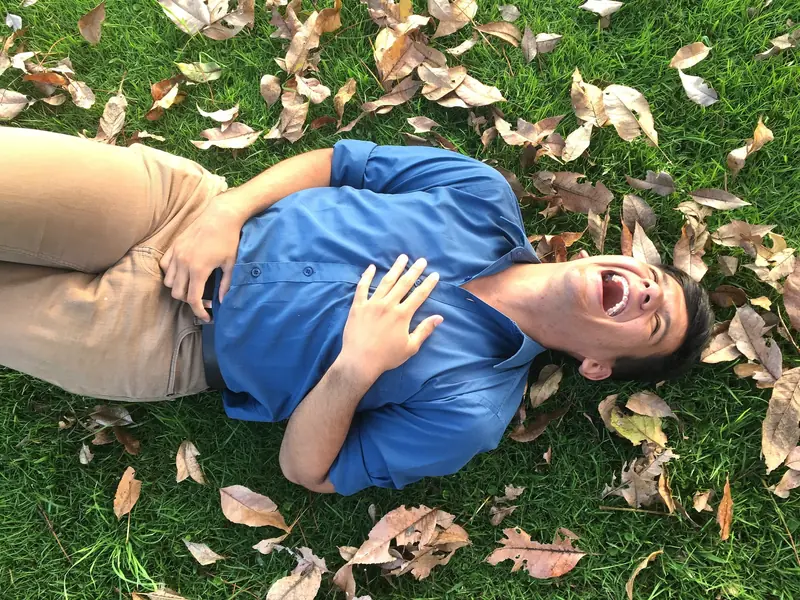
Have you ever met someone who never laughs? If so, you probably tried to say goodbye to them as quickly as possible. Why? Because we instinctively gravitate towards cheerful, smiling people with whom it’s enjoyable and beneficial to spend time. Don’t believe that it’s beneficial? You should, because it’s been proven that laughter heals not just the soul, but the body as well. Perhaps that’s why, in times when society is struggling with illness, we see a surge of comedians.
Laughter Therapy – A Branch of Psychology
Laughter helps people live. This is crucial for those who are ill and constantly under stress to understand. Moreover, this psychological approach can also be beneficial for preventive measures—simply to maintain a good mood in everyday life, which inevitably boosts immunity.
This type of therapy (gelotology) became possible thanks to William Fry from Stanford University, a specialist in psychiatry. He laid the foundations of laughter therapy in the 1960s, dedicating an entire scientific work to his theory. The first person to put this theory into practice was journalist Norman Cousins, who suffered from spinal inflammation. An eternal optimist, he believed that positive emotions determine a person’s health. He fought his back pain with large doses of vitamin C and by watching comedy shows. Ultimately, it really helped him!

Today, many scientific organizations are seriously studying humor. One of them is the Association for Applied and Therapeutic Humor (AATH).
According to specialists, laughter therapy has several fundamental directions:
- The classic approach includes comedies, jokes, and funny stories. This material serves as the foundation for gelotology sessions.
- One method within the independent technique or author’s approach involves reflex laughter, facial exercises, creativity development activities, and more.
- Hospital clowning aims to distract patients (primarily children) and their parents from the sad realities of everyday life.
Of course, laughter meditation cannot replace prescribed medical treatment. However, it has a powerful impact on mood, resulting in a healthy body that begins to function with renewed vigor. In this context, gelotologists also highlight two additional directions—hospital therapy and laughter yoga. The first format is applied to those who are ill, while the second serves as a preventive measure.
Contagious, Humorous Social – What Types of Laughter Exist?
Humor, sarcasm, and biting remarks—like any other medicine, laughter doesn’t always heal. Sometimes, a harsh mockery can lead to the exact opposite effect. Therefore, it’s worth considering Sigmund Freud’s theory, which posited that not all humor is capable of healing, and he developed a unique list of seven types of laughter:
Malicious Humor
Freud defined this as laughter at someone when one considers them inferior. It is often fueled by prejudices and intolerance towards others’ shortcomings.
Giggles
This is commonly found in children, but adults can also catch this type of laughter. Sometimes, a person doesn’t even understand what causes it; they just laugh because it’s funny. The benefit of such laughter lies in its ability to relieve stress and tension.
Jokes
This category can include so-called “dark” humor. Jokes help break down barriers of what is acceptable and challenge stereotypes.
Self-Irony
People often intentionally make themselves the target of jokes. They might say something awkward or act clumsily. Freud associates this with a lack of attention.
Satire
This is the highest form of irony, a sharp mockery. Shakespeare and Gogol mastered satire. It truly heals, but with “surgical” methods, allowing one to speak the truth directly to the offender.
Obsequious Laughter
This is typically used when someone wants to flatter another person. Generally, this type of laughter is considered manipulative and does not foster genuine emotional expression.
Healing Laughter
Freud referred to this as comic laughter. In this case, laughter is shared, not directed at someone. This sincere laughter is the most effective in terms of healing.

What Are the Benefits of Laughter?
Unfortunately, many people lack laughter in their lives. While children laugh around 400 times a day, adults manage only about 15. Meanwhile, gelotologists highlight several beneficial aspects of this phenomenon:
- Reduction of stress hormone levels and an increase in endorphins, which improves immune system function;
- Training of the diaphragm, cardiovascular system, and abdominal muscles;
- Distraction from negative emotions;
- Social benefits—laughter connects us with others;
- A brief break—after a “humorous” pause, productivity increases significantly.
The positive effects of a smile manifest regardless of whether it’s genuine or forced. So, always try to find a reason to laugh—rather than complaining about life’s troubles, just laugh at them. It will lighten the mood not only for you but also for those around you. Smile always—outdoors, at home, at work, and while spending time with loved ones. After all, a smile is something that inspires trust and positivity, and it truly brings people together.

Interesting Facts About Laughter
Traditionally, April 1st is celebrated as April Fools’ Day. On this day, many jokes are shared, and pranks are played—just to have a good laugh at each other’s expense. In connection with this date, here are some interesting facts related to laughter:
- Besides humans, chimpanzees and rats can laugh—especially when tickled;
- Seventeen muscle groups are engaged when smiling, while over 300 are involved in laughter, including muscles in the back, abdomen, arms, and legs;
- Brazilian and Cuban people smile the most, while Scandinavians smile the least;
- Women laugh more often than men—partly because they have a slightly different sense of humor.
- Comedians tend to live much longer than satirists. This conclusion was reached by scientists who studied the lifespans of various actors over the past three centuries.
- You can actually earn quite a bit from laughter—just one smile from American Todd Gordon is worth $4,000 in a commercial, while the fortune of famous comedian Jim Carrey exceeds $180 million.
- Waitstaff who always smile at their customers receive twice as much in tips.
So, smile or laugh for your health—and may laughter prolong your life!
